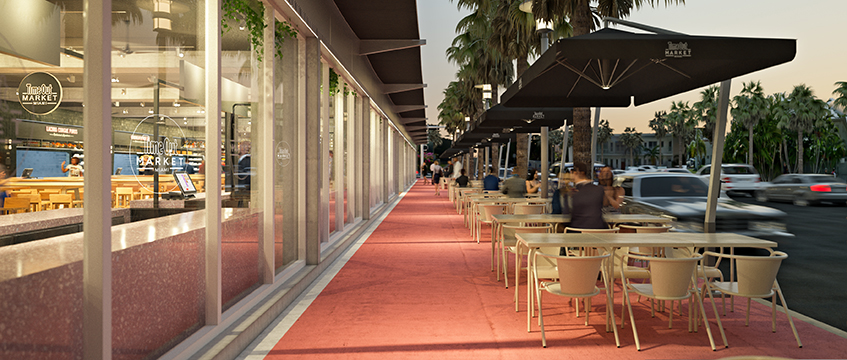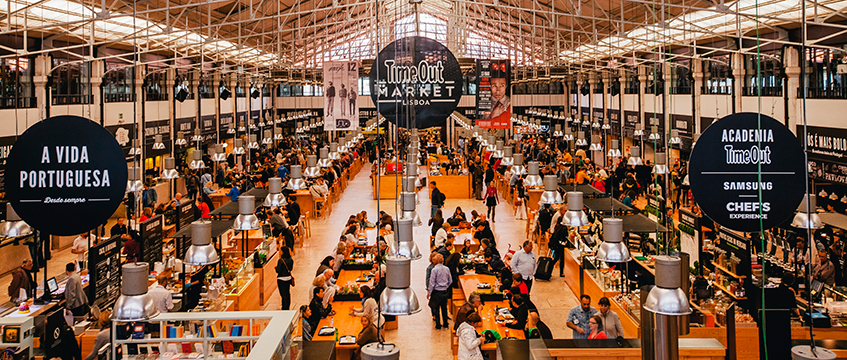Global media and entertainment business Time Out is appealing Tower Hamlets Council’s decision to reject its plans for a food market in Spitalfields, E1, with support from its landlord.
In the group’s latest results it said that if planning was granted the market could open in late 2019 or early 2020. In the meantime, it would continue to explore other sites in the city.

In the year ended 31 December 2017 revenue at its flagship market in Lisbon (above) grew by 62% to £6m, driven by a record 3.6m annual visitors. Total tenant turnover increased by 52% to €33.1m (£28.8m).
Other global openings remain on track, with a lease recently signed for a Time Out Market in New York, although it still needs to secure licence approval and building permits.
Despite plans for its debut London site being rejected by Tower Hamlets last year, Time Out Markets chief executive Didier Souillat is convinced he will win over the planning committee.
It found the 20,000 sq ft property on Commercial Road, E1, opposite Spitalfields market, in 2016, but the council rejected the licensing application and refused permission to house the market in the listed building.
“It used to be an old stable and so it has a lot of character, and a lot of character is very important to us,” said Souillat. “In the refit idea the plan is to keep the integrity of the building and there are a lot of new businesses and developments there that need somewhere to eat.”
Planning appeal
Time Out Markets is looking to appeal the decision with support from the building’s landlord and Souillat remains positive that this will work. “People were very much looking forward to us coming here,” he says.
“You have to follow the [planning] process. You will always have a few residents that will go up in arms and a planning committee that decides to follow this recommendation against the advice of its planners. We have a lot of advice and support from the landlord and the chances of success are pretty substantial,” he adds.
But even if all goes to plan, it will still be a lengthy process. Souillat does not think that planning will come through until the summer. Realistically that means the market would not open for business until late 2019 at the earliest.
“Then after that you have to get a licence, which will again probably be declined, and then you appeal again. So, it takes a serious amount of time, resources and money when all we are trying to do is to bring something to the environment, create 200 jobs and a substantial investment at the time of Brexit when there is a lot of uncertainty.”
 The Time Out Market in Lisbon is located in a market hall in the former red light district. Since the editors of the Lisbon Time Out magazine took over the site in 2014, it has turned a run-down neighbourhood into a vibrant part of town. The 70,000 sq ft market includes 32 restaurants and kiosks, 150 cooking workshops and a 900-capacity venue. In 2016, it was visited by 3.1m people.
The Time Out Market in Lisbon is located in a market hall in the former red light district. Since the editors of the Lisbon Time Out magazine took over the site in 2014, it has turned a run-down neighbourhood into a vibrant part of town. The 70,000 sq ft market includes 32 restaurants and kiosks, 150 cooking workshops and a 900-capacity venue. In 2016, it was visited by 3.1m people.
This is what Souillat and his team want to re-create in London as well as globally. In addition to its London plans, Time Out Market Miami (pictured above) is set to open this year, with sites in Boston and Chicago following in 2019.
Landlord love
Despite difficulties with planners, Souillat says his dealings with landlords have been positive.
“We work with many landlords and most of them have shown us a significant amount of love. It is really nice to feel loved by the landlords,” he says. “We bring big investment and a lot of capex, so for the regeneration of areas we can be key.”
Souillat believes that retail and leisure developments will in future be anchored by food halls. “To a certain extent we are replacing department stores,” he says. “We bring the footfall and quality to a space.”
Foodie competition
Souillat has global ambitions for expansion so long as the cities meet his specific criteria of being “foodie”.
“We will be targeting major cities, yes, I cannot say how many exactly, but every ‘foodie’ city that has a substantial population is interesting to us – but it has to be a foodie city with a lot of restaurants, a lot of upcoming chefs. Every city eats, we know that, but there are trends and there are cities which are more foodie than others,” he says.
Against the backdrop of these growing “foodie” communities, other food halls and trends have emerged in recent years, including rival food hall concept Eataly and the growing trend of street food markets, yet Souillat does not view these as direct competitors.
“Eataly is great and I think that they are doing a fantastic job globally at rolling out their Italian concept, but they are the best of Italy and we are the best of the city. We are quite different,” he says. “They tend to go with malls and we tend to go with our own iconic buildings and locations.”
He is similarly keen to stress that Time Out Markets is not a part of the street food phenomenon.
“There are some very strong street food operators in London, but we are not doing street food,” he says.
“I have nothing against it, I think it is great. We are a much more food-led concept which represents the food of the city.”
Recipe for expansion
Although expansion plans seem ambitious, particularly following the hurdles in London, Soulliat believes that his experience from expanding the Hakkasan Group of upmarket Chinese restaurants from three to 35 sites will carry Time Out Market through to global success.
“It is all about the right locations, the right landlords, and the right partners,” he says. “The main thing is to make sure that the brand remains true to itself wherever it goes and that it takes a little bit of the local environment with it. That’s what we are doing with Time Out Market. Whenever you enter a market, wherever it is, you will know it is a Time Out Market. You enter a Hakkasan and you know it is a Hakkasan.”
Although most of his experience comes from expanding brands physically, Soulliat appreciates the importance of expanding and maintaining digital platforms alongside a brand.
“You need digital to make the physical better. You need tech,” he says. “Time Out’s digital global reach on a monthly basis is 52m users – what do you think that does for the market? Wonders. Data is the new currency. Without that media platform and that reach then I wouldn’t be opening markets.”
To send feedback, e-mail amber.rolt@egi.co.uk or tweet @AmberRoltEG or @estatesgazette











